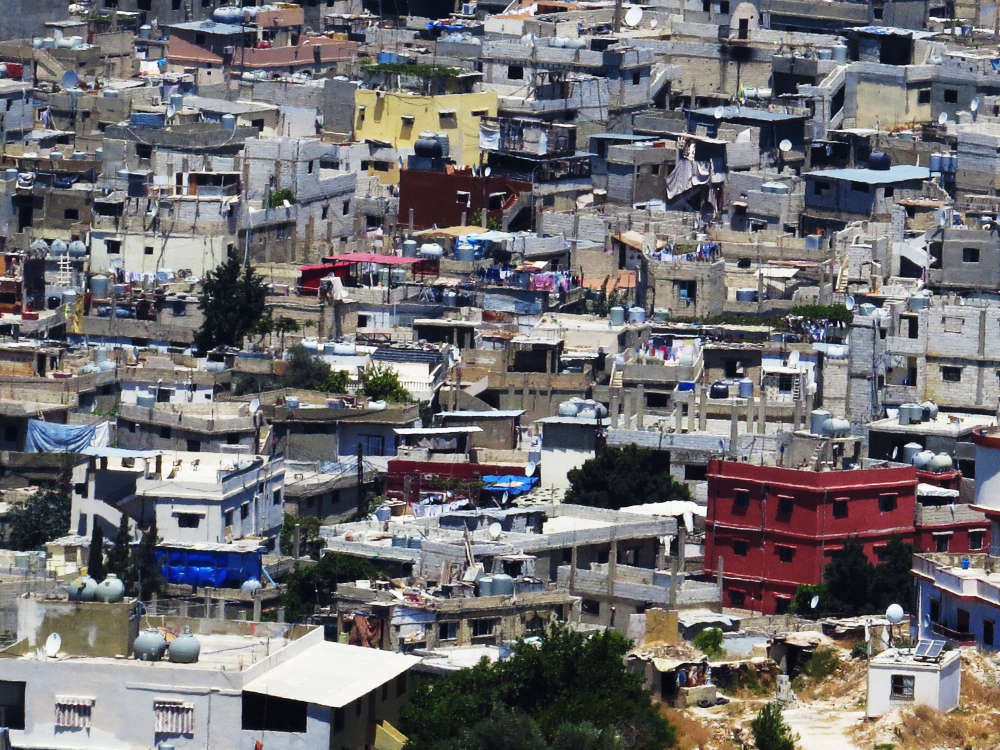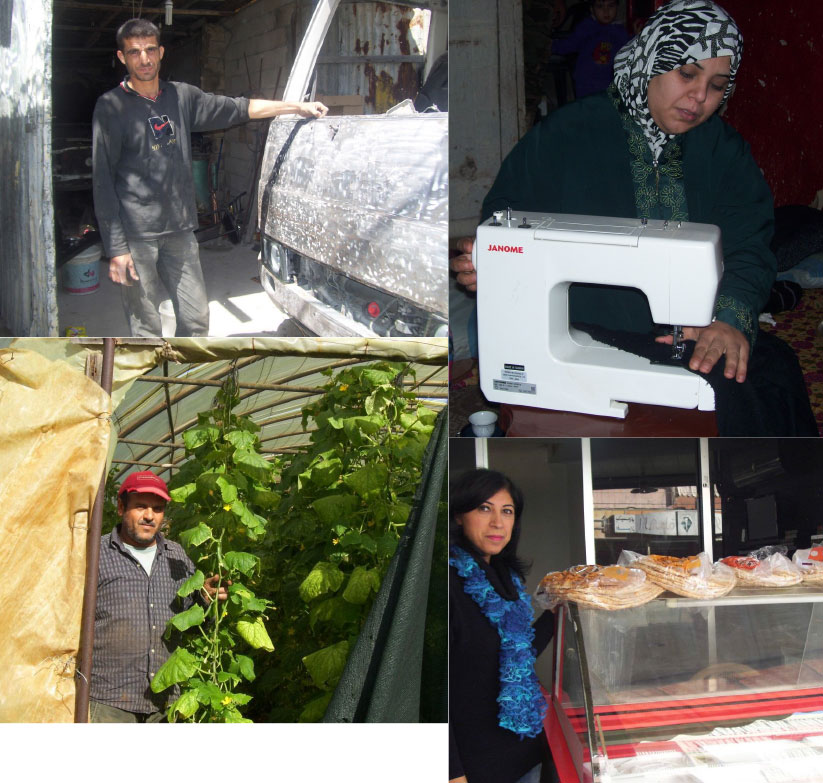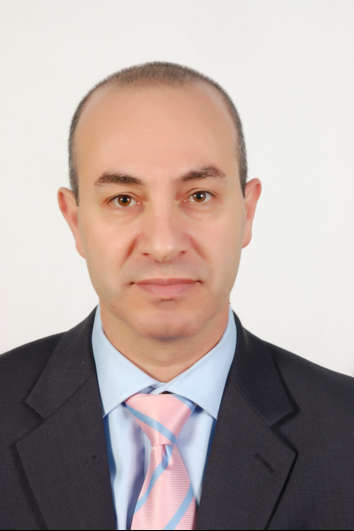The Palestine Investment Fund’s Economic Empowerment Program for Palestinian Refugees in Lebanon provides Palestinians with the tools they need – access to finance, in particular – to build a secure and prosperous future.
When Mohammad Khalaf looks out over his thriving vegetable fields in southern Lebanon, an air of pride appears in his eyes. “When I started this farm, we only had five acres. Today, there are one hundred – with ten to twelve workers each day.” Khalaf, a Palestinian refugee in Lebanon, grows many items typical of the Palestinian cultivator: zahara baladi, the Palestinian cauliflower known for its mustardy hue and irresistible texture, grows by the hundreds in his fields. His produce showers under the mist of a modern sprinkler and generator system, shielded from the harsh summer sun by rows of layered tents. With these modern techniques, Khalaf is able to utilize almost one hundred percent of his rented agricultural land, generating income for his workers while supplying the market with high-quality produce. “Now that we are using generators and sprinklers, each acre of land takes 3,500 seedlings,” Khalaf explained. “Using our old-fashioned methods, it used to take 2,500 seedlings. That’s a 1,000-seedling difference – and that difference is yours, it’s your profit.”
Khalaf’s success was enabled in part by a microfinance loan from the Palestine Investment Fund (PIF). Through PIF’s Economic Empowerment Program for Palestinian Refugees in Lebanon, Khalaf received two loans totaling some $4,000, which enabled him to purchase his new agricultural tents and sprinkler system. Without such assistance, Khalaf, as well as many Palestinian refugees in Lebanon, struggle to create a secure and sustainable economic future for themselves and their families.
Palestinian refugees in Lebanon face a variety of challenges, particularly those of an economic nature. A little help goes a long way towards securing their economic futures and encouraging their resilience.
Close to 175,000 Palestinian refugees live in Lebanon, with many residing in the country’s 12 refugee camps.i However, they are not entitled to several critical rights – for example, they cannot work in as many as 36 professions.ii Among the five UNRWA fields – Lebanon, Jordan, Syria, the West Bank, and Gaza – Lebanon has the highest percentage of Palestinian refugees living in abject poverty.

The number of Palestinian refugees in Lebanon has grown over the past half decade due the ongoing conflict in Syria. Hundreds of Palestinian refugee families have fled from Syria to Lebanon, heightening the need for programs and initiatives that provide the Palestinian community with relief and opportunity.
PIF’s Economic Empowerment Program for Palestinian Refugees in Lebanon seeks to do just that. The program alleviates the Palestinian refugee community’s challenges by providing them with access to finance. Since its inception, the program has dispersed over 2,700 flexible-term loans, ranging from $500 to $5,000, that aim to help Palestinian refugees launch new projects or expand existing initiatives.

Without equitable access to Lebanon’s labor market and financial system, Palestinian refugees struggle to secure financing and support for their companies and ideas. The Economic Empowerment Program has helped to fill that gap by lending to a wide and diverse range of individuals across the Palestinian refugee community; some 42 percent of loan recipients are youth, and 26 percent of all recipients are women.
PIF’s empowerment program – carried out and funded alongside its donor partners – has had a uniquely positive impact on Palestinian refugees in Lebanon. By helping the community secure higher incomes, the program encourages holistic improvements to Palestinian livelihoods – from healthcare to education and beyond. Further, the program allows Palestinian youth to secure their futures by providing them with the tools they need to advance their careers, pursue education, and achieve their dreams.
“Young people in Lebanon work hard to get an education in order to have job opportunities,” explained Alaa Kamal Ghazal, a young recipient who used the loan to expand his family’s supermarket. The expansion helped fund his college tuition. “God knows where I would have been [without the loan]. Maybe I wouldn’t have completed my education.”
Other recipients, such as Ribab Abu Rawees, used the loan to start a new business. “I always felt I was capable of starting my own business, but my financial situation wouldn’t allow it.” Ribab used her loan to start a hairdressing shop – but she didn’t stop there. “I wanted to continue to advance my work, so I applied for a second loan from PIF’s program,” Ribab explained. “With this loan, I opened a small perfume shop for my brother. He began to earn a monthly income, and together, we increased our profits.” Ribab went on to apply for a third loan from PIF’s empowerment program, this time using the financing to open a small barbershop for her second brother. “These loans helped me pursue my dreams and chase my ambitions – ones I had deep within me,” Ribab explained. “The loans made my dreams a reality.”
All in all, the Economic Empowerment Program has helped Palestinian refugees improve their livelihoods and secure new job opportunities by providing them with microfinance loans. By the end of 2017, the program had dispersed loans worth more than $4.5 million. PIF’s donor partners in the Economic Empowerment Program are Silatech and the Arab Fund, and its on-the-ground implementation partners include the General Union of Palestinian Women, the Lebanese Association for Development, or Al Majmoua, the Association for the Development of Rural Capacities, and the Association Najdeh.
The Lebanon program is part of Ruwwad, PIF’s program for social investment. Ruwwad seeks to increase access to finance and spur innovation through capacity building and human capital investment. It focuses on segments that cannot be fully addressed through impact investment and consists of five community-focused initiatives, including the Lebanon program, which leverage capital from local and international donors and investors to improve Palestinian livelihoods in a sustainable manner. Through Ruwwad, PIF maintains social investment programs in the West Bank, Jerusalem, and Gaza, focusing on areas that include entrepreneurship, SMEs, education, and innovation.
Microfinance is a critical enabler for the Palestinian refugee community in Lebanon.
The Palestine Investment Fund is proud to have launched the Economic Empowerment Program for Palestinian Refugees in Lebanon, as well as other social investment initiatives that focus on alleviating the economic pressures facing refugees. PIF is committed to refugee empowerment as one of its core strategic, social principles.
i Statistic pulled from the Palestinian Central Bureau of Statistics’ 2017 census: http://www.pcbs.gov.ps/site/512/default.aspx?lang=en&ItemID=3013.
ii More on Palestinian employment restrictions in Lebanon can be found in UNRWA’s infographic: https://www.unrwa.org/resources/reports/employment-palestine-refugees-lebanon-overview.


